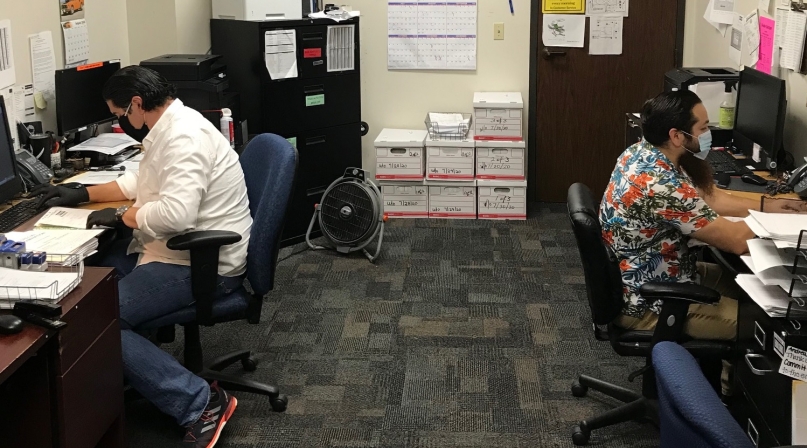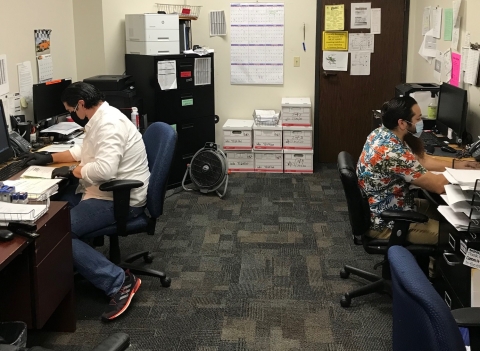Problem:
|
The state of Texas saw an upward trend in vehicle title rejections.
|
Solution:
|
Create a special investigation unit to oversee the vehicle title transfer and registration process.
|
When Bexar County, Texas Tax Assessor-Collector Albert Uresti began to notice a trend of vehicle title work rejected throughout the county, he knew he needed to investigate.
The Bexar County Tax Assessor-Collector’s Motor Vehicle Registration Department oversees the processing of more than two million vehicle title transfers and registrations each year. The county partners with private agencies or full-service title companies to offer more than 60 additional vehicle registration locations with extended business hours for county residents.
These full-service title companies process 40 percent of the county’s title transfer work and 20 percent of vehicle registration renewals.
Learn More
Bexar County’s A Proven Defense Against Vehicle Title Fraud — The Special Investigation Unit — is the recipient of a Best in Category 2020 NACo Achievement Award in the County and Administration Management category.
Uresti explained how rejections for vehicle title work came from private, unregulated individuals and full-service title companies, which led to the formation of the Special Investigation Unit (SIU). The unit serves as a quality control department and examines vehicle title transfer applications and related documents.
“We just felt like we needed to go after this problem and try to curtail the activity as much as possible,” Uresti said.
The unit’s staff examines titles to identify clerical errors and conducts unannounced visits to full-service title companies to review documents as well as inventory for license plates and registration stickers.
“We’ll go and make surprise spot checks in order to keep everybody on their toes,” Uresti said.
Fraudulent activity includes altered titles, false names and addresses and multiple transactions from the same individuals or companies. Uresti said staff in the unit check titles, odometer readings to see if they have been rolled back or purposefully written down incorrectly and sales tax numbers to ensure the state receives the proper amount. The unit also regulates full-service title companies to ensure they’re not overcharging for title transfers.
“I can’t tell you how many times we see people who buy vehicles and they just sign over the title and their odometer may be wrong,” he said. “What it [the unit] does is protect our citizens from getting into bad deals.”
The issue of vehicle title fraud was a challenge in the county and would have become a bigger issue if not prevented, Uresti said. He explained how natural disasters such as hurricanes or flooding exacerbate the problem when vehicles come to the county from out of state.
“There’s a lot of extra illegal activity so it’s important that we are able to monitor everything,” he said.
The SIU has now expanded its role to review and monitor the work of the Tax Assessor-Collector office and property tax operations.
“Because of the fact that we reacted quickly and put this unit together, we were able to avoid a lot of the problems that other counties had,” he said.
The SIU has stopped fraudulent activity and uncovered 37 different addresses reoccurring on vehicle title applications used for over 700 title transfers. The unit also stopped a group of 17 individuals working as independent consultants who were not licensed or authorized.
“We had really gotten it down to a fine art,” Uresti said.
The unit has a staff of five to six full-time employees who all completed training in-house and through the department of motor vehicles, he said.
“We took the initiative and used everybody’s training including our in-house experience to be able to make our people experts,” Uresti said.
According to Uresti, the unit is beneficial to the county because it reviews every transaction put forward by full-service title companies.
“To have a designated team that looks at every single transaction, that has a workplace assigned and that also checks property tax as well as motor vehicles, that’s what makes us unique,” he said.
During the pandemic, the county has been able to offer 60 fully operational private business partners through the full-service title companies that are available to the public when county lobbies closed. The county does not pay to operate these locations. Uresti estimated it would cost between $3 million to $5 million per year to operate just three of the locations if the county were to shut down the full-service title company business model.
“It protects our citizens from having bad transactions, illegal transactions and the titles not done right,” he said. “People can feel good about buying a vehicle if they come to our office or to a full-service title company.”
Uresti advises other counties interested in replicating the full-service title company model to ensure that businesses have brick and mortar locations and the county serves as the watchdog.
“They can be a blessing if you have strong oversight over these companies and they can provide a lot more access,” he said. “As budgets are being cut back… this is a very inexpensive way to provide additional locations and additional services for the community.”




